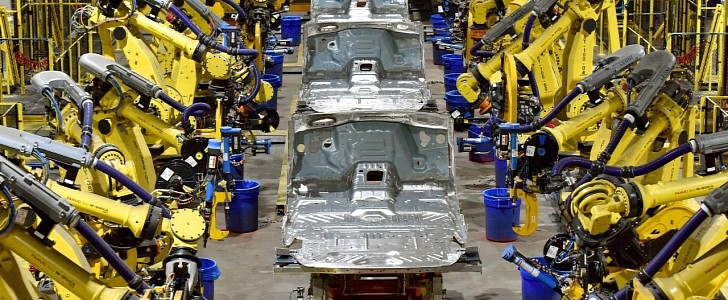American car giant Ford is once again turning to painful decisions to deal with the ongoing chip shortage. The company has confirmed that two of its plants in North America will go offline for a full week starting on Monday due to the lack of semiconductors.
In other words, Ford has no chips to install on the vehicles it builds, so the company has no other way to deal with the whole thing than to stop making vehicles entirely.
This should provide the carmaker with more time to improve the chip inventory and therefore resume production at normal speeds after one week of downtime.
The affected facilities are the Kentucky Truck Plant, where Ford builds the Expedition, the Lincoln Navigation, and the Super Duty Trucks, and the Ohio Assembly Plant in charge of building the Super Duty and the medium-duty trucks.
While it’s hard to tell how many vehicles would eventually be affected by the downtime, Ford says it’s working around the clock on finding new ways to maintain the production going for high-demand vehicles.
In other words, the company is prioritizing the manufacturing of its most popular models, so in case the vehicle you just ordered isn’t one of Ford’s big hits, the waiting times might be much higher.
While Ford is struggling to find a way to minimize the disruptions caused by the chip shortage, the world seems to be thinking that the semiconductor crisis could come to an end either in the second half of this year or at some point in 2023.
More substantial signs of recovery should be recorded in the coming months, though, on the other hand, some experts believe that making an accurate prediction is impossible right now. There are also concerns that the chip shortage could expand well beyond 2023, especially if foundries across the world end up struggling with other challenges, including production disruptions, for a longer period of time.
This should provide the carmaker with more time to improve the chip inventory and therefore resume production at normal speeds after one week of downtime.
The affected facilities are the Kentucky Truck Plant, where Ford builds the Expedition, the Lincoln Navigation, and the Super Duty Trucks, and the Ohio Assembly Plant in charge of building the Super Duty and the medium-duty trucks.
While it’s hard to tell how many vehicles would eventually be affected by the downtime, Ford says it’s working around the clock on finding new ways to maintain the production going for high-demand vehicles.
In other words, the company is prioritizing the manufacturing of its most popular models, so in case the vehicle you just ordered isn’t one of Ford’s big hits, the waiting times might be much higher.
While Ford is struggling to find a way to minimize the disruptions caused by the chip shortage, the world seems to be thinking that the semiconductor crisis could come to an end either in the second half of this year or at some point in 2023.
More substantial signs of recovery should be recorded in the coming months, though, on the other hand, some experts believe that making an accurate prediction is impossible right now. There are also concerns that the chip shortage could expand well beyond 2023, especially if foundries across the world end up struggling with other challenges, including production disruptions, for a longer period of time.
















